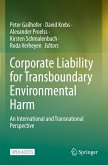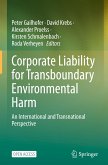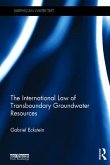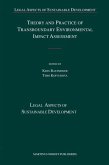Smart Mixes for Transboundary Environmental Harm
Herausgeber: Erp, Judith van; Nollkaemper, André; Faure, Michael
Smart Mixes for Transboundary Environmental Harm
Herausgeber: Erp, Judith van; Nollkaemper, André; Faure, Michael
- Gebundenes Buch
- Merkliste
- Auf die Merkliste
- Bewerten Bewerten
- Teilen
- Produkt teilen
- Produkterinnerung
- Produkterinnerung
Analyzes how combinations of instruments at different levels of government, or smart mixes, can effectively regulate transboundary environmental harm.
Andere Kunden interessierten sich auch für
![Transboundary Harm in International Law Transboundary Harm in International Law]() Rebecca M. Bratspies / Russell A. Miller (eds.)Transboundary Harm in International Law134,99 €
Rebecca M. Bratspies / Russell A. Miller (eds.)Transboundary Harm in International Law134,99 €![Corporate Liability for Transboundary Environmental Harm Corporate Liability for Transboundary Environmental Harm]() Corporate Liability for Transboundary Environmental Harm33,99 €
Corporate Liability for Transboundary Environmental Harm33,99 €![Corporate Liability for Transboundary Environmental Harm Corporate Liability for Transboundary Environmental Harm]() Corporate Liability for Transboundary Environmental Harm41,99 €
Corporate Liability for Transboundary Environmental Harm41,99 €![Transboundary Damage in International Law Transboundary Damage in International Law]() Hanqin XueTransboundary Damage in International Law190,99 €
Hanqin XueTransboundary Damage in International Law190,99 €![The International Law of Transboundary Groundwater Resources The International Law of Transboundary Groundwater Resources]() Gabriel EcksteinThe International Law of Transboundary Groundwater Resources201,99 €
Gabriel EcksteinThe International Law of Transboundary Groundwater Resources201,99 €![Prosecuting Environmental Harm before the International Criminal Court Prosecuting Environmental Harm before the International Criminal Court]() Matthew GillettProsecuting Environmental Harm before the International Criminal Court124,99 €
Matthew GillettProsecuting Environmental Harm before the International Criminal Court124,99 €![Theory and Practice of Transboundary Environmental Impact Assessment Theory and Practice of Transboundary Environmental Impact Assessment]() Theory and Practice of Transboundary Environmental Impact Assessment278,99 €
Theory and Practice of Transboundary Environmental Impact Assessment278,99 €-
-
-
Analyzes how combinations of instruments at different levels of government, or smart mixes, can effectively regulate transboundary environmental harm.
Hinweis: Dieser Artikel kann nur an eine deutsche Lieferadresse ausgeliefert werden.
Hinweis: Dieser Artikel kann nur an eine deutsche Lieferadresse ausgeliefert werden.
Produktdetails
- Produktdetails
- Verlag: Cambridge University Press
- Seitenzahl: 366
- Erscheinungstermin: 28. März 2019
- Englisch
- Abmessung: 235mm x 157mm x 24mm
- Gewicht: 680g
- ISBN-13: 9781108428385
- ISBN-10: 110842838X
- Artikelnr.: 54026072
- Herstellerkennzeichnung
- Libri GmbH
- Europaallee 1
- 36244 Bad Hersfeld
- gpsr@libri.de
- Verlag: Cambridge University Press
- Seitenzahl: 366
- Erscheinungstermin: 28. März 2019
- Englisch
- Abmessung: 235mm x 157mm x 24mm
- Gewicht: 680g
- ISBN-13: 9781108428385
- ISBN-10: 110842838X
- Artikelnr.: 54026072
- Herstellerkennzeichnung
- Libri GmbH
- Europaallee 1
- 36244 Bad Hersfeld
- gpsr@libri.de
List of figures; List of tables; List of contributors; Preface; List of
abbreviations; Part I. Conceptual Approaches to Smart Mixes: 1.
Introduction: the concept of smart mixes for transboundary environmental
harm Judith van Erp, Michael Faure, André Nollkaemper, Niels Philipsen,
Jing Liu and Markos Karavias; 2. 'Smart' public-private complementarities
in the transnational regulatory and enforcement space Linda Senden; 3.
Smart mixes and the challenge of complexity: lessons from global climate
governance Philipp Pattberg and Oscar Widerberg; 4. Smart (and not so
smart) mixes of new environmental policy instruments Rüdiger Wurzel,
Anthony Zito and Andrew Jordan; Part II. Fisheries and Forestry: 5. The
pursuit of good regulatory design principles in international fisheries
law: what possibility of smarter international regulation? Richard Barnes;
6. Mixing regional fisheries management and private certification Markos
Karavias; 7. RFMO-MSC smart regulatory mixes for transboundary tuna
fisheries Agnes Yeeting and Simon R. Bush; 8. Smart mixes in forest
governance Jing Liu; 9. Governing forest supply chains: ratcheting up or
squeezing out? Constance McDermott; 10. Public sector engagement with
private governance programs: interactions and evolutionary effects in
forest and fisheries certification Lars Gulbrandsen; Part III. Climate
Change and Oil: 11. Smart mixes, non-state governance and climate change
Neil Gunningham; 12. Private control of public regulation: a smart mix? The
case of greenhouse gas emission reductions in the EU Marjan Peeters and
Mathias Muller; 13. Smart mixes with respect to civil liability regimes for
marine oil pollution Michael Faure and Hui Wang; 14. Regulatory mixes in
governance arrangements in (offshore) oil production: are they smart? Jan
van Tatenhove; Part IV. Concluding Remarks: 15. Conclusion: smart mixes in
relation to transboundary environmental harm Judith van Erp, Michael Faure,
André Nollkaemper and Niels Philipsen.
abbreviations; Part I. Conceptual Approaches to Smart Mixes: 1.
Introduction: the concept of smart mixes for transboundary environmental
harm Judith van Erp, Michael Faure, André Nollkaemper, Niels Philipsen,
Jing Liu and Markos Karavias; 2. 'Smart' public-private complementarities
in the transnational regulatory and enforcement space Linda Senden; 3.
Smart mixes and the challenge of complexity: lessons from global climate
governance Philipp Pattberg and Oscar Widerberg; 4. Smart (and not so
smart) mixes of new environmental policy instruments Rüdiger Wurzel,
Anthony Zito and Andrew Jordan; Part II. Fisheries and Forestry: 5. The
pursuit of good regulatory design principles in international fisheries
law: what possibility of smarter international regulation? Richard Barnes;
6. Mixing regional fisheries management and private certification Markos
Karavias; 7. RFMO-MSC smart regulatory mixes for transboundary tuna
fisheries Agnes Yeeting and Simon R. Bush; 8. Smart mixes in forest
governance Jing Liu; 9. Governing forest supply chains: ratcheting up or
squeezing out? Constance McDermott; 10. Public sector engagement with
private governance programs: interactions and evolutionary effects in
forest and fisheries certification Lars Gulbrandsen; Part III. Climate
Change and Oil: 11. Smart mixes, non-state governance and climate change
Neil Gunningham; 12. Private control of public regulation: a smart mix? The
case of greenhouse gas emission reductions in the EU Marjan Peeters and
Mathias Muller; 13. Smart mixes with respect to civil liability regimes for
marine oil pollution Michael Faure and Hui Wang; 14. Regulatory mixes in
governance arrangements in (offshore) oil production: are they smart? Jan
van Tatenhove; Part IV. Concluding Remarks: 15. Conclusion: smart mixes in
relation to transboundary environmental harm Judith van Erp, Michael Faure,
André Nollkaemper and Niels Philipsen.
List of figures; List of tables; List of contributors; Preface; List of
abbreviations; Part I. Conceptual Approaches to Smart Mixes: 1.
Introduction: the concept of smart mixes for transboundary environmental
harm Judith van Erp, Michael Faure, André Nollkaemper, Niels Philipsen,
Jing Liu and Markos Karavias; 2. 'Smart' public-private complementarities
in the transnational regulatory and enforcement space Linda Senden; 3.
Smart mixes and the challenge of complexity: lessons from global climate
governance Philipp Pattberg and Oscar Widerberg; 4. Smart (and not so
smart) mixes of new environmental policy instruments Rüdiger Wurzel,
Anthony Zito and Andrew Jordan; Part II. Fisheries and Forestry: 5. The
pursuit of good regulatory design principles in international fisheries
law: what possibility of smarter international regulation? Richard Barnes;
6. Mixing regional fisheries management and private certification Markos
Karavias; 7. RFMO-MSC smart regulatory mixes for transboundary tuna
fisheries Agnes Yeeting and Simon R. Bush; 8. Smart mixes in forest
governance Jing Liu; 9. Governing forest supply chains: ratcheting up or
squeezing out? Constance McDermott; 10. Public sector engagement with
private governance programs: interactions and evolutionary effects in
forest and fisheries certification Lars Gulbrandsen; Part III. Climate
Change and Oil: 11. Smart mixes, non-state governance and climate change
Neil Gunningham; 12. Private control of public regulation: a smart mix? The
case of greenhouse gas emission reductions in the EU Marjan Peeters and
Mathias Muller; 13. Smart mixes with respect to civil liability regimes for
marine oil pollution Michael Faure and Hui Wang; 14. Regulatory mixes in
governance arrangements in (offshore) oil production: are they smart? Jan
van Tatenhove; Part IV. Concluding Remarks: 15. Conclusion: smart mixes in
relation to transboundary environmental harm Judith van Erp, Michael Faure,
André Nollkaemper and Niels Philipsen.
abbreviations; Part I. Conceptual Approaches to Smart Mixes: 1.
Introduction: the concept of smart mixes for transboundary environmental
harm Judith van Erp, Michael Faure, André Nollkaemper, Niels Philipsen,
Jing Liu and Markos Karavias; 2. 'Smart' public-private complementarities
in the transnational regulatory and enforcement space Linda Senden; 3.
Smart mixes and the challenge of complexity: lessons from global climate
governance Philipp Pattberg and Oscar Widerberg; 4. Smart (and not so
smart) mixes of new environmental policy instruments Rüdiger Wurzel,
Anthony Zito and Andrew Jordan; Part II. Fisheries and Forestry: 5. The
pursuit of good regulatory design principles in international fisheries
law: what possibility of smarter international regulation? Richard Barnes;
6. Mixing regional fisheries management and private certification Markos
Karavias; 7. RFMO-MSC smart regulatory mixes for transboundary tuna
fisheries Agnes Yeeting and Simon R. Bush; 8. Smart mixes in forest
governance Jing Liu; 9. Governing forest supply chains: ratcheting up or
squeezing out? Constance McDermott; 10. Public sector engagement with
private governance programs: interactions and evolutionary effects in
forest and fisheries certification Lars Gulbrandsen; Part III. Climate
Change and Oil: 11. Smart mixes, non-state governance and climate change
Neil Gunningham; 12. Private control of public regulation: a smart mix? The
case of greenhouse gas emission reductions in the EU Marjan Peeters and
Mathias Muller; 13. Smart mixes with respect to civil liability regimes for
marine oil pollution Michael Faure and Hui Wang; 14. Regulatory mixes in
governance arrangements in (offshore) oil production: are they smart? Jan
van Tatenhove; Part IV. Concluding Remarks: 15. Conclusion: smart mixes in
relation to transboundary environmental harm Judith van Erp, Michael Faure,
André Nollkaemper and Niels Philipsen.








